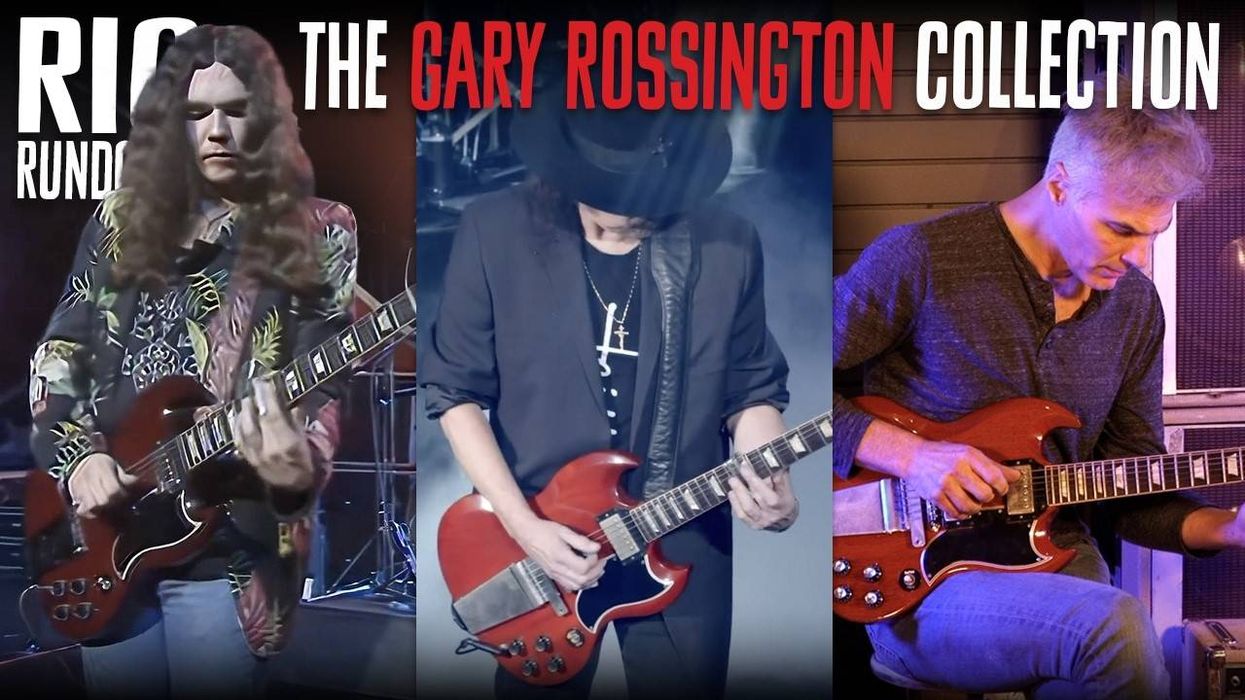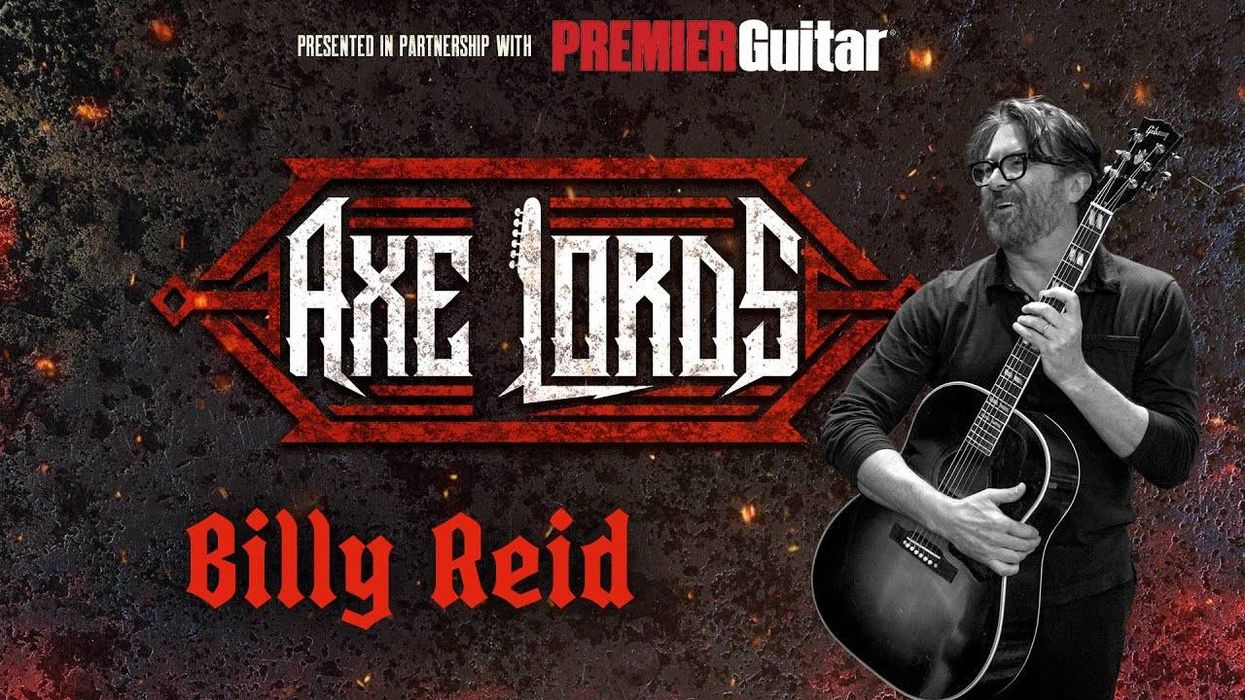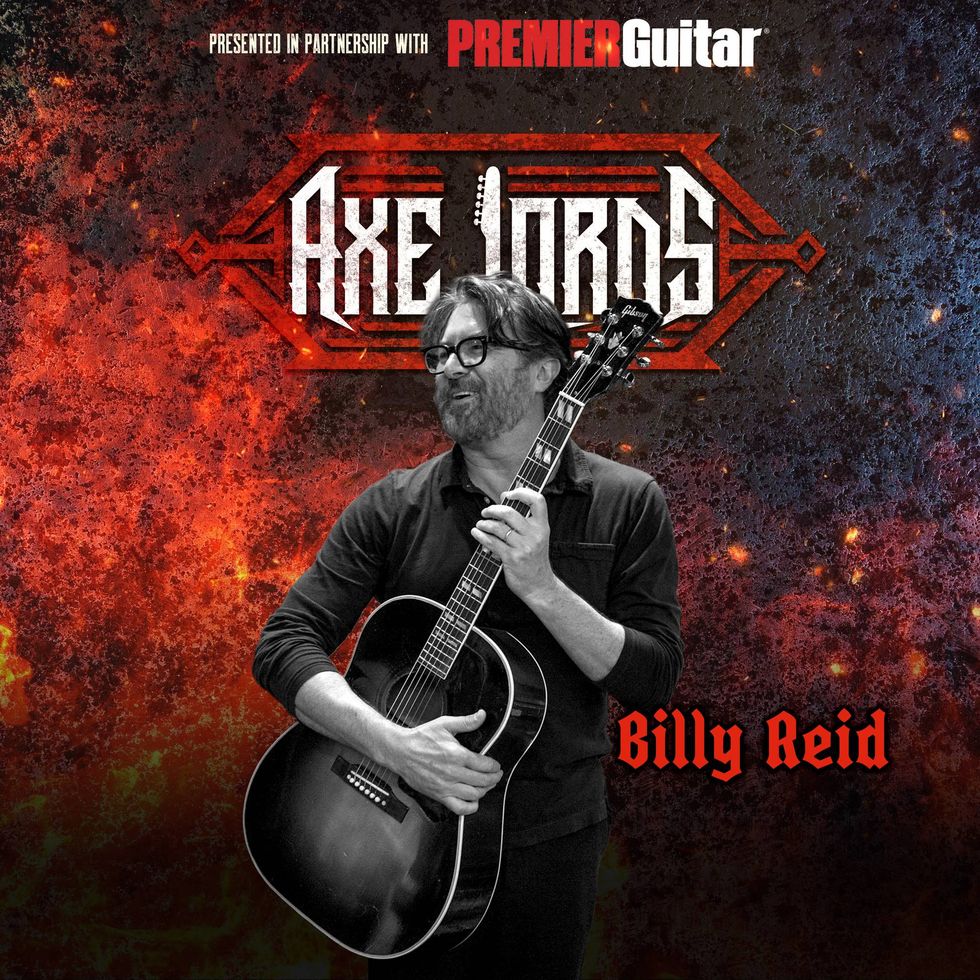Defining “Hurricane” Nita Strauss is difficult. She’s one of the most visible players out there, yet she’s still underappreciated by the mainstream. As a solo artist, Strauss is the premier torchbearer for ’80s-informed shred metal, but her music sounds modern, and her “day job” is as a first-call session and touring guitarist for the biggest names in pop and classic rock—from Demi Lovato to Alice Cooper. She also regularly tops lists of the best female guitarists, but the truth is she’s simply one of the finest contemporary guitarists—period.
Embracing every opportunity and refusing to be pigeonholed, Strauss is proud of her music, regardless of style or who she makes it with. She also flies the flag for female rock ’n’ rollers while calling out any limitations that might put her in a box.
“A really nice illustration is when Yvette Young and I had signature guitars come out the same year,” Strauss says. “I played her guitar, and she played mine, for about 15 seconds, and we handed them back. We were like, ‘We hate it.’ [Laughs.] Her style is so vastly different from mine that her guitar was so uncomfortable for me to play. We’re just so different. That [diversity] is what makes it great.”
For her new single, “The Wolf You Feed,” Nita Strauss enlisted vocalist Alissa White-Gluz of Arch Enemy. Released in October, the high-octane track already has more than 2 million views on YouTube.
It’s not that Strauss rejects labels. It’s just that if she had her way, the rest of the world would drop the preconceived notions that come with them. Case in point, Strauss is the first woman to have her own signature Ibanez guitar, called the JIVA. She’s incredibly proud of the honor. But it didn’t happen because she’s a woman—obviously. It happened because she’s so damn good.
“I was always on that relentless pursuit for shred,” the L.A. native says. “My family didn’t have a lot of money, growing up, so I couldn’t afford lessons or anything like that. I just absorbed whatever I could from listening to albums and watching instructional DVDs. But when I saw Steve Vai in Crossroads, that was my aha moment of, like, ‘That’s what I want to do.’”
“The first album was almost like a temper tantrum.”
Strauss’ style is still informed by the players on those DVDs. While a lot of modern rock and metal embraces 7- and 8-string guitars, jerking prog rhythms, and harmonic dissonance, she leans toward Malmsteen, Petrucci, Friedman, and Vai. “I think the reason why a band like Animals as Leaders was so groundbreaking is because they said, ‘This is who we are, and this is what we write.’ If I chased that [prog-metal] trend, I wouldn’t be authentic. And I think you have to be authentic as a songwriter.”
Which brings us to Strauss’ first solo album. Controlled Chaos, released in 2018, clearly demonstrates her authenticity, which resonates with fans. The album was fueled by a Kickstarter campaign that aimed to raise $20,000 but reached an impressive $165,755. A full-on shred record, it brings to mind classics like Cacophony’s Speed Metal Symphony, Jason Becker’s Perpetual Burn, and Joe Satriani’s Surfing with the Alien. She puts on a clinic in high-octane electric guitar heroics from beginning to end. And the rock world noticed. Controlled Chaos landed in the Top 10 of Billboard’s new artist, indie label, hard music, rock, and internet charts, and hit No. 20 in top albums. The second single, “Mariana Trench,” was chosen by the World Wrestling Federation as the theme for its NXT TakeOver: War Game 2018 livestream. Not bad for her first adventure into solo guitar music—one she never wanted to undertake in the first place.

Nita Strauss has toured with Alice Cooper since 2014, but her first high-profile gig was with the Iron Maidens, a festival-level-touring Iron Maiden tribute band that she joined in 2010.
Photo by Annie Atlasman
But Jack Butler changed all that. “It was actually my hero, Steve Vai, that pushed me off the edge and into the deep end of the pool,” Strauss says. “He asked me to contribute a song to a compilation album [2017’s She Rocks, Vol. 1], and I agreed without having a song to contribute. I mean, I’m not going to say no! [Laughs.] I sat down at my kitchen table the next day, and I wrote ‘Pandemonium,’ which was my first solo single.”
The song was a hit, with well over a million views on YouTube. Diving in headfirst, Strauss then knew exactly what a Nita Strauss solo album should sound like, and no one was going to get in her way. “The first album was almost like a temper tantrum,” she laughs. “I had so much to say, and I didn’t let anybody into my creative process. I produced it, and I recorded everything. Then, when it came out and was super well-received, that made me realize, ‘Yes, I can do this.’”
“I was always on that relentless pursuit for shred.”
It wasn’t long before Strauss was planning her next record, due in early 2023. And this album will be different. She determined it would still feature plenty of technical playing and demonstrate her songwriting and production skills, but she’d supercharge it with some of the most well-known vocalists in the heavy-rock game.
So far, three singles have been released as teasers. In October 2021, Strauss turned loose “Dead Inside.” Her guitars sound heavier, the song structure is catchier, and the intense playing is pushed over the top by the signature rasp of Disturbed’s David Draiman. The tune made Strauss the first solo female artist to top the Active Rock radio chart and has more than 10 million streams on Spotify. Her instrumental banger “Summer Storm” was released in August 2022, followed by the even wilder aggro-shred diamond “The Wolf You Feed,” featuring singer Alissa White-Gluz of Arch Enemy. In its first day on YouTube in October, "The Wolf You Feed" garnered 670,000 views and, as of this writing, has surpassed 2 million views.
Nita Strauss’ Gear

How sturdy are Strauss’ workhorse Ibanez signature model JIVA guitars? Tough enough for whammy-bar levitation with feedback every night onstage.
Photo by Ken Settle
Guitars
- Ibanez Signature JIVAX2
- Ibanez Signature JIVA10
- Custom Ibanez Signature JIVAJR
Amps & Effects
- Boss GT-1000 Effects Processor
- Kemper Profiler
Strings & Picks
- D’Addario NYXLs (.010–.046)
- Grover Allman .60 mm
But Strauss admitted that writing for vocalists isn’t as easy as her instrumental work. Making things even more challenging was that she had no idea who would end up singing on the new tracks. She was, as she puts it, “writing for a style of vocalist. It was a huge challenge for me. I had to take into account a singer’s vocal range, style, lyrical content, and what rhymes with what. But there was only one song, I think, where it was actually that singer [I imagined] that ended up on the track. For most songs that I would write, I’d go, ‘I’d like someone like this singer or that singer.’”
If you’re wondering who the other vocalists on her upcoming album are, you’re not alone. So far, Strauss has played the details extremely close to the vest. What she will discuss is the gear she used throughout.
Rig Rundown - Nita Strauss
“Live, for my solo band, I use a BOSS GT-1000 pedalboard,” she says. “But for my session work, it’s my Kempers, and the majority of the record is the same tones you hear onstage with the Kemper. Funny enough, it’s modeled from my previous processor, which is a Rocktron Prophesy. It’s not modeled from any amp in particular. It’s just pinched, pulled, massaged, and tweaked to be my own tone. When I switched over to Kemper, I couldn’t find anything I liked as much, so I hooked up the modeling software and modeled my processor. And it’s my signature Ibanez JIVAs across the board—all the gigs, all the time.”

Although she’s currently on tour with Demi Lovato, Strauss still considers herself part of Alice Cooper’s band. She joined the troupe of the veteran rocker, who gave her the nickname Hurricane Nita, in 2014.
Photo by Annie Atlasman
With the new record being done for quite some time and two successful singles already released, you might wonder, “Where’s the album?” Strauss says she is so busy with other projects that it’ll have to wait a while more. On top of her hectic solo career, she remains an active member of the Alice Cooper band, a spot she’s held since Orianthi’s departure in 2014. Sonically, she’s the perfect fit, and her stunning performances led Cooper to give her the nickname “Hurricane.” While Orianthi brought her fabulous blues/classic rock approach, Strauss’ style sounds custom-built for Cooper’s ’80s, ’90s, and current catalog. She’s such a fixture of the band that fans were stunned when she recently stepped out of Cooper’s tour to hit the road with pop mega-star Demi Lovato. (Meanwhile, guitarist Kane Roberts has returned to Cooper’s band.) Those fans, of course, quickly took to social media to voice their opinions.
How could a shred-metal hero go pop? “Easy,” says Strauss. “Demi is an absolute powerhouse of a vocalist and a performer. And I’m not gate-keeping rock like a lot of these people are. Demi had it made. She had everything she ever wanted as a pop star. She had no reason to go back to her original love of rock and heavy music unless she really wanted to. And, honestly, it’s a rock show, and a rock show is a rock show. I’m using my same guitars, my same rig.
“Demi is an absolute powerhouse of a vocalist and a performer. And I’m not gate-keeping rock like a lot of these people are.”
“When I got this opportunity, I went to Alice and talked to him face-to-face. I said, ‘I have this opportunity and I’d really like to do it, but it would conflict with our fall tour. What do you think?’ He said, ‘Go, I’m so excited for you. Take a break and if you want to come back, come back.’ And that was it. There was no I quit, I’m out, I’m finished. In my mind, I’m not any more or less a part of the band than I ever was.”
Lovato is touring with an all-female band that also includes bass player Leanne Bowes, keyboardist Danielle McGinley, and drummer Brittany Bowman. Strauss sees it as an opportunity to bring great rock to a new audience. “There are so many people to inspire at any show,” Strauss says. “Maybe one person every single night will look at Britt, or look at me, or Leanne, or Demi and go, ‘I want to do that! I went to a Demi Lovato show, and now I want to get a guitar for Christmas instead of a video game console.’ That’s what it’s all about.”
How Nita Strauss Gets Huge Tones with No Amp
Strauss knows what she’s talking about. She remembers when she was the one watching her guitar heroes rocking millions of fans. “Jennifer Batten was a big one! Seeing a girl standing up there with the big boys, in the big gig, playing the Super Bowl, playing the biggest stage in the world, that was a big inspiration for me. She’s the best!” (Batten played with Michael Jackson as part of 1993’s Super Bowl XXVII halftime show.)
Fascinatingly, as the Los Angeles Rams’ official in-house guitarist—not the most common position in a football franchise—Strauss also regularly displays her prowess in the NFL. And she has a Super Bowl ring to prove it. But how does she balance a solo career, playing with classic rock royalty, sharing the stage with the biggest names in pop, and still be there for every snap of the football?
“It’s definitely been challenging trying to keep everything straight in my head,” she admits. “But I love playing guitar as much as anyone going home from their jobs and picking up their guitars and playing. It is exhausting, but it doesn’t feel like work.”Nita Strauss performs "The Show Must Go On": The 2019 She Rocks Awards
Nita Strauss is all about melody and tone as she plays “The Show Must Go On,” from Controlled Chaos, at the 2019 She Rocks Awards at the House of Blues in Anaheim, California.











![Rig Rundown: Russian Circles’ Mike Sullivan [2025]](https://www.premierguitar.com/media-library/youtube.jpg?id=62303631&width=1245&height=700&quality=70&coordinates=0%2C0%2C0%2C0)

















